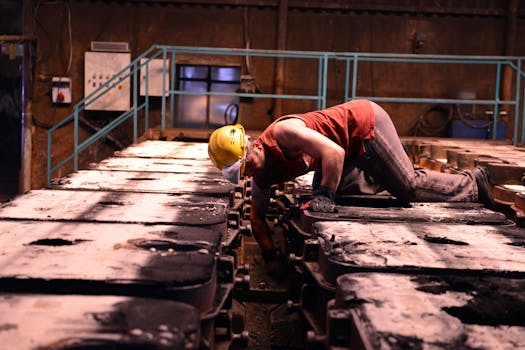The manufacturing sector in Germany is undergoing significant transformations due to automation and globalization. As traditional roles evolve, new opportunities arise, creating a dynamic landscape for workers.
This evolution presents both challenges and opportunities. Workers must adapt to new technologies while also finding ways to utilize these advancements for personal and professional growth.
In this article, we will explore how automation and globalization are reshaping the manufacturing sector, impacting production roles, and creating digital opportunities for workers in Germany.
Understanding the Impact of Automation on Manufacturing
Automation is revolutionizing manufacturing processes by integrating advanced technologies. This integration improves efficiency, reduces labor costs, and enhances production capabilities across various industries.
As machines take on repetitive tasks, human roles are shifting toward complex problem-solving and oversight. Consequently, workers need to adapt to the changing demands of their jobs.
Manufacturers are increasingly seeking workers with technical skills who can work alongside machines. This trend emphasizes the importance of reskilling for existing employees to remain competitive in their roles.
Moreover, automation can lead to significant reductions in production time. Embracing these changes enables companies to respond to market demands swiftly and efficiently, ensuring long-term viability.
While automation raises concerns about job displacement, it also creates opportunities for new positions in developing and maintaining technology. This transition requires a proactive approach to workforce development.
Globalization and Its Influence on Manufacturing Jobs
Globalization has expanded market access for manufacturers, leading to a more interconnected economy. Consequently, this trend influences production practices and job opportunities in Germany.
As production moves across borders, manufacturers can capitalize on lower labor costs in different regions. This shift may result in the relocation of certain jobs, particularly in lower-skilled roles.
Conversely, globalization fosters new job creation in sectors like logistics and supply chain management. As companies adapt, workers will find evolving roles that require a blend of traditional and digital skills.
Furthermore, globalization encourages competition. Manufacturers in Germany must innovate to maintain their edge, which translates into a demand for skilled workers who can drive this innovation forward.
The interplay between globalization and automation means that workers need to be agile. Embracing lifelong learning will equip them to navigate these complex changes effectively.
Shifting Skills Requirements in the Manufacturing Sector
The evolving manufacturing landscape highlights the demand for new skill sets. Traditional manufacturing skills are being complemented by digital literacy and technical know-how.
Employers now prefer candidates with a proficiency in data analysis and software management alongside mechanical skills. This shift illustrates the importance of adapting to technological advancements.
Training programs must reflect this changing skill set. Enhancing educational curriculum will prepare future workers for roles that do not yet exist, ensuring they remain relevant.
Furthermore, collaboration between educational institutions and industries is essential. By aligning training programs with employer needs, workers can better transition into new roles.
Continuous education, therefore, becomes crucial. Upskilling will help workers secure positions in a manufacturing sector that is increasingly driven by technology.
The Role of Digital Opportunities in Manufacturing
The rise of digital technologies is opening new pathways for workers in manufacturing. Roles in data analytics, cybersecurity, and AI development are becoming increasingly vital.
Digital tools facilitate innovative manufacturing processes, allowing for enhanced productivity and quality control. Workers can leverage these tools to streamline operations and improve efficiency.
Moreover, remote work options are emerging in areas such as product design and engineering. This flexibility allows for a broader talent pool and changes traditional workplace dynamics.
Online platforms are also fostering collaboration among global teams. As digital communication tools become commonplace, workers must possess the skills to engage effectively across diverse teams.
The combination of traditional manufacturing with digital innovations is creating a unique blend of opportunities. Embracing this transition can enhance job satisfaction and career advancement potential.
Challenges Faced by Workers in the Transition
While the shift towards automation and globalization presents opportunities, it also brings challenges. Many workers face uncertainty regarding job security as traditional roles diminish.
The need for reskilling can be daunting for many, especially those who have spent years in one type of job. Therefore, employers should support workers through this transition.
Moreover, disparities exist in access to training resources, particularly in disadvantaged communities. Ensuring equal access to education and training programs is essential for an inclusive workforce.
Additionally, there is a risk of skills mismatch, where workers may find themselves with outdated skills for the new economy. Addressing this issue requires proactive planning and investment in education.
Overall, navigating these challenges requires an open mindset. Workers must be willing to adapt, learn, and grow as the manufacturing landscape continues to evolve.
Building a Workforce Prepared for the Future
To thrive in the changing manufacturing environment, workers must develop a growth mindset. This approach emphasizes continuous learning and flexibility in adapting to new roles and technologies.
Partnerships between businesses, educational institutions, and governments can pave the way for comprehensive training programs. These initiatives will equip workers with the foundational skills they need to succeed.
Furthermore, organizations should prioritize mentorship programs. Pairing experienced workers with new entrants can foster knowledge-sharing and skills development.
Encouraging a culture of innovation within companies is equally important. Workers should feel empowered to propose new ideas and explore new technologies without fear of failure.
Ultimately, investing in the workforce will yield benefits for businesses and employees alike, creating a resilient, skilled labor force prepared to navigate future challenges.
Conclusion
In conclusion, the shifts in the manufacturing sector due to automation and globalization are reshaping workforce dynamics. While challenges exist, opportunities abound for those willing to adapt and learn.
By prioritizing continuous education and fostering a culture of innovation, workers can position themselves for success in a rapidly changing environment. Embracing these changes will be essential for both individual and industry growth.
The future of manufacturing in Germany will depend significantly on how well workers and employers navigate these transformative shifts. Together, they can build a brighter, more prosperous future.
